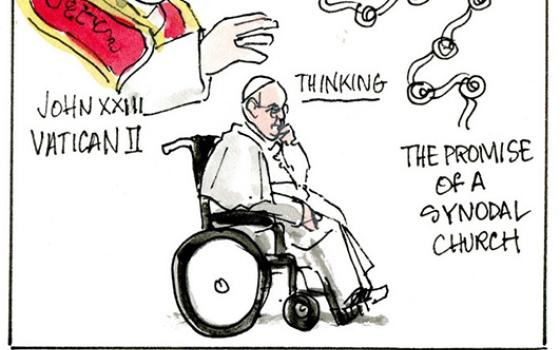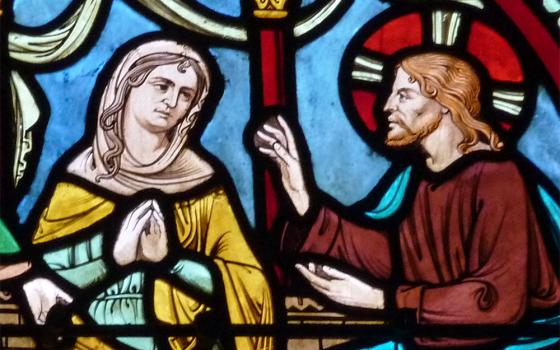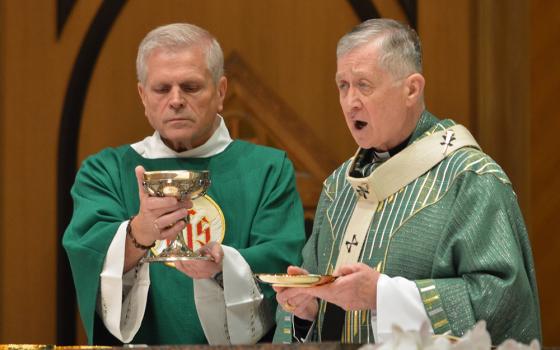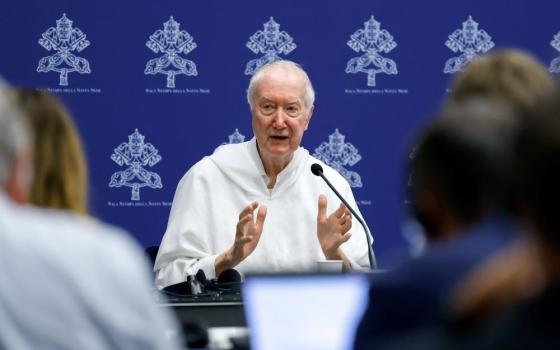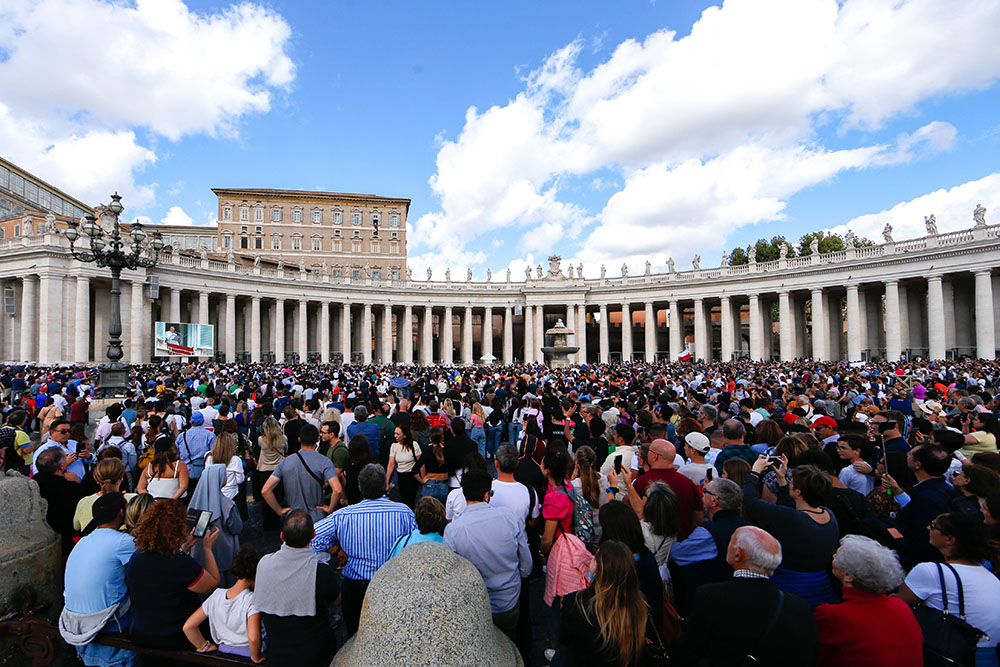
Visitors gather in St. Peter's Square at the Vatican to pray the Angelus with Pope Francis Oct. 29. (CNS/Lola Gomez)
The final document from the now-concluded assembly of the synod on synodality will receive a tepid reception in some quarters. But the text captures what happened, and what happened is extraordinary when viewed through an ecclesiological lens.
Some progressives must have thought Pope Francis was talking about more than the autumnal time change when he closed the final meeting by reminding the delegates to set their clocks back. If anyone thought the synod needed to make major changes in church teaching, they were disappointed.
For example, Jesuit Fr. James Martin told my colleagues Christopher White and Joshua McElwee that he was "disappointed but not surprised" the final document did not mention LGBT issues.
"There were widely diverging views on the topic," said Martin. "I wish, however, that some of those discussions, which were frank and open, had been captured in the final synthesis."
If you thought such lack of "progress" meant that conservatives were going to be dancing in the street, you would be wrong. The former prefect of the Congregation for the Doctrine of the Faith, Cardinal Gerhard Müller, is one of many conservatives worried the whole process was leading the church astray. "In reality, they are developing an understanding that is not coherent with the Catholic faith," he told the National Catholic Register in the final week of meetings.
It is almost inconceivable to think that a future synod would be convoked with only bishops present.
It is as if the cardinal, and others like him, can't imagine any posture other than the defensive crouch they have acquired.
In the days and weeks ahead, we can expect such positions to harden among those who reduced this synodal process to particular outcomes on particular issues. They have ignored the warnings many of us have given to think in a less linear way, to manage expectations and to keep focused on the ways this entire process has been rooted in the ecclesiology of Vatican II.
What are the results of this laborious, intense monthlong meeting? Early in the final document, the synod delegates state:
The bishops, united among themselves and with the Bishop of Rome, made manifest the Church as a communion of Churches. Lay people, those in consecrated life, deacons and priests were, together with the bishops, witnesses of a process that intends to involve the whole Church and everyone in the Church. Their presence reminded us that the Assembly is not an isolated event, but an integral part and a necessary step in the synodal process. The multiplicity of interventions and the plurality of positions voiced in the Assembly revealed a Church that is learning to embrace a synodal style and is seeking the most suitable ways to make this happen.
The rebalancing of Roman Catholic ecclesiology in the past 150 years, from the First Vatican Council's assertion of papal primacy and infallibility in Pastor Aeternus to the Second Vatican Council's Lumen Gentium, is now complete. Primacy gave way to collegiality and now to a synodality involving the entire people of God.
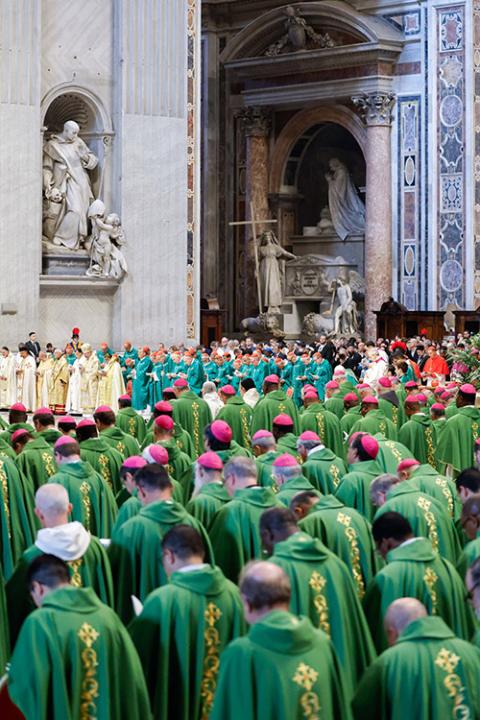
Cardinals and bishops join Pope Francis as he presides over Mass, marking the end of the first session of the assembly of the synod of on synodality at the Vatican Oct. 29. (CNS/Lola Gomez)
It is almost inconceivable to think that a future synod would be convoked with only bishops present. The commitment to continue this kind of synodal dialogue comes through every page of the report.
It was always inconceivable, and remains so, to think the synod would overthrow the hierarchic structure of the church. Yes, everyone going into the synodal process must surrender to the Holy Spirit, but a bishop surrenders as a bishop and a layperson as a layperson. The hierarchic structure of the church was balanced at Vatican II, it wasn't tossed out.
What happened this month, finally, was the implementation of the ecclesiology of Lumen Gentium. The variety of ecclesiological images of the church contained in that document were manifested in this monthlong, consultative meeting that was itself the culmination of a consultative process that might have been the largest and widest in the history of the world.
One synod delegate emailed me after the document was passed:
The intensive experience of synodal dialogue allowed us to encounter our global fellow pilgrims in profoundly affective collegiality, calling us to focus on the core realities of our faith, to wrestle intensively and creatively with the profound human and ecclesial dilemmas that confront us, often coming to "both/and" pathways for "either/or" solutions, seeking to proceed from the marriage of love and truth in all of its wrenching difficulty.
I will red-flag a concern here. "The exercise of co-responsibility is essential for synodality and is necessary at all levels of the Church," states the final report. "Every Christian is a mission in the world." The synodal process needs to make sure it is not hijacked by professional Catholics, those with the time, training and interest to exercise co-responsibility — people like you, dear reader, and me. As a class, we can become insufferable. The B+ Catholics, even the D+ Catholics, need to be engaged on their terms if this synodal process is to be small "c" Catholic.
We can hope additional reporting will clarify how the synodal conversations were framed, and what tensions emerged not along ideological lines but along cultural and geographic ones.
Advertisement
In a podcast with my Tablet colleague Christopher Lamb, Dominican Fr. Timothy Radcliffe, who led the retreat that opened the synod, talked about the synod's discussion of the role of women in the life of the church. He said, among other things, "we have to be very aware of not imposing a Western feminist agenda on the whole church" (14:10 in the podcast).
He went on to discuss the ways Westerners, not just the church, often look at the rest of the world as if it is their job to "catch up" with Westerners. It will be very interesting to learn more about those kinds of dynamics and how they affected the conversations in the aula.
These cross-cultural currents manifested themselves in the final document at various places. For example, early on we read:
In particular, the many expressions of synodal life in cultural contexts where people are used to walking together as a community and individualism has not taken root, should be considered for deeper reflection. In this way, synodal practice plays an important part in the Church's prophetic response to an individualism that causes people to turn in on themselves, a populism that divides, and a globalisation that homogenises and flattens. Although not solving these problems, it nonetheless provides an alternative way of being and acting for our times, integrating a diversity of perspectives.
The synod delegates capture the connection between individualism and other social pathologies in ways that escape most Americans.
Not only does Francis insist on charity in all things, but he asks us to revisit the line between what is essential and what isn't.
It will also be interesting to find out if the synodal conversations, when confronted with divergent opinions about ethics, searched for common points of departure and discussion in other theological fields, such as Christian anthropology, ecclesiology and dogmatics. Our American habit of casting most issues in terms of rights doesn't work in the church. We can best find common ground when we start with what is revealed about the human person in the revelation of Jesus Christ (cf. Gaudium et Spes, 22). How did these discussions play out in the room?
What is different about this papacy, and about the synod this pope convoked, is the invitation to think deeply about the maxim, attributed to St. Augustine: in essentials, unity; in doubtful matters, liberty; in all things, charity.
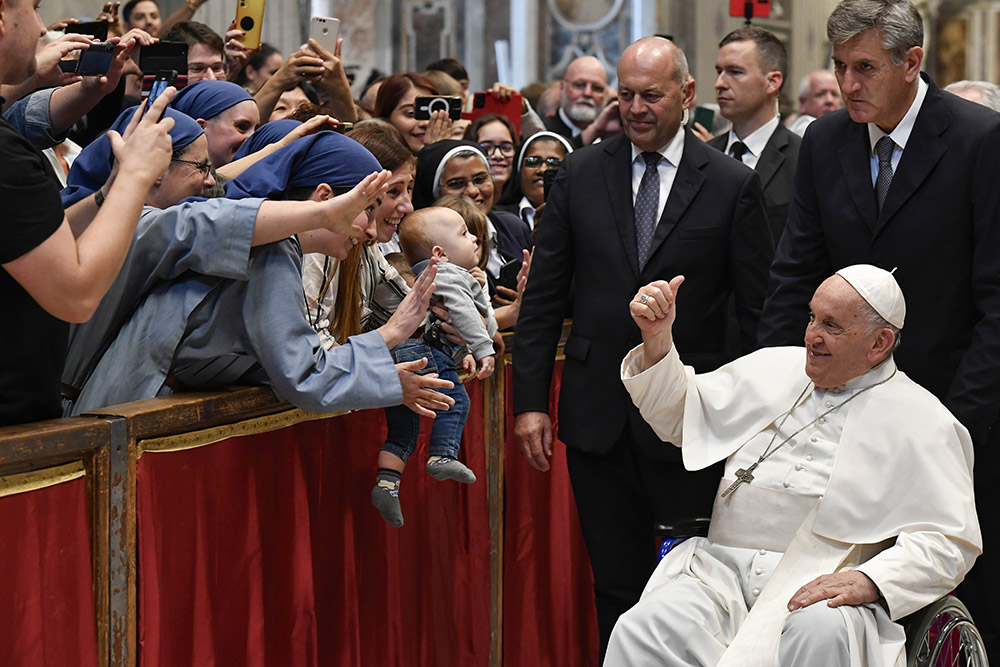
Pope Francis greets the faithful after Mass in St. Peter's Basilica at the Vatican Oct. 29, marking the conclusion of the first session of the Synod of Bishops on synodality. (CNS/Vatican Media)
Not only does Francis insist on charity in all things, but he asks us to revisit the line between what is essential and what isn't. I hope the synodal discussions looked at that line closely.
For reasons some find inadequate and others necessary, the first three post-conciliar popes all discerned the need to restrain some of the centrifugal forces unleashed by Vatican II. Francis recognizes that the full reception of Vatican II depends on reengaging, maybe even encouraging, those centrifugal forces.
The means he has adopted is this synodal process, no doubt in large part because of his experience of synodal processes in Latin America. For all their diversity, the churches in Latin America share many common bonds, whereas the global church contains many sociocultural barriers.
Overcoming those barriers to forge ecclesial unity by synodal means is not going to be easy. It is remarkable how many synod delegates used words like "hard work" and "exhausting" to describe their meetings!
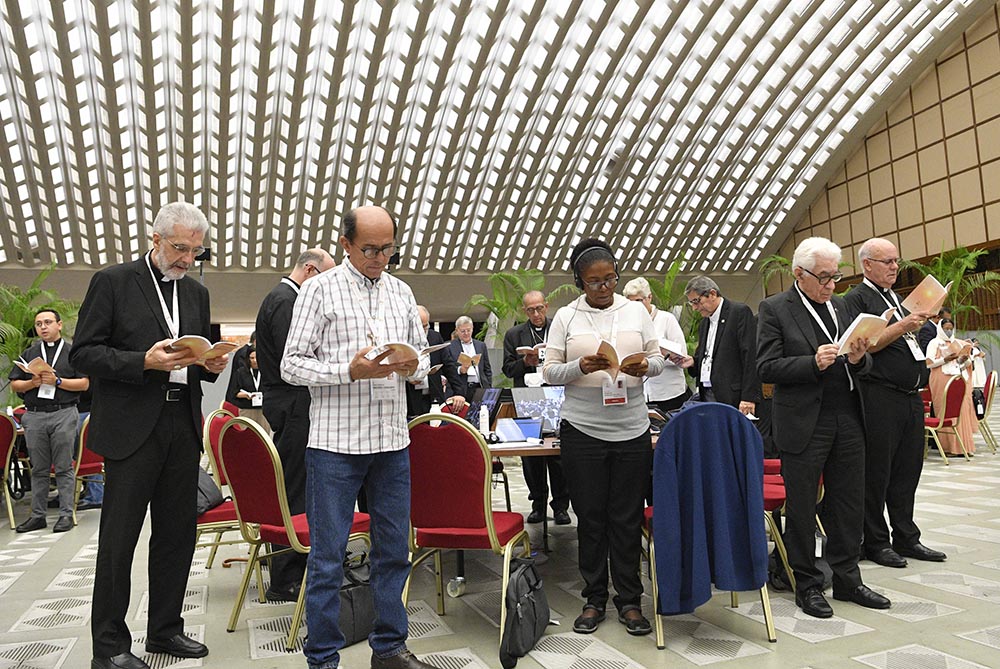
Members of the assembly of the Synod of Bishops gather for morning prayer Oct. 27 in the Paul VI Audience Hall at the Vatican. (CNS/Vatican Media)
Conservatives are betting, maybe some are even hoping, that the whole synodal process will prove too exhausting and that the church will return to their preferred method of forging ecclesial unity: obedience to a clerical caste and especially to the Roman Curia.
That approach has proven its inadequacies in too many ways to mention, from the clergy sex abuse crisis to the Vatican's financial messes to the willful ignorance of the changing hopes and dreams of that half of the human race that is female!
Francis has asked us all to try a different approach, a synodal approach. The synod just concluded has asked us to thoughtfully and prayerfully continue down the synodal path. The delegates' creative enactment of the ecclesiology of Vatican II may not satisfy some, but it is a major breakthrough in the reception of Vatican II.
It is worth continuing down this path. Besides, there really is no alternative.





